Sophia Kianni is an 18-year-old climate and environmental activist. She is the founder and executive director of Climate Cardinals: an international nonprofit with over 4,000 members working to translate climate information into over 100 languages. She is also a part of many notable organizations and movements such as Extinction Rebellion. Kianni presented at the third session time slot on Tuesday 21st July.
Every story has a beginning. Climate Cardinal’s story began when its founder Sophia Kianni was in Middle School and visited her parent’s country of origin, Iran. The air pollution was so severe that around 1,500 people were hospitalized because of it. Kianni realized that many people in Iran were not aware of the threat of climate change.This was because there was a lack of scientific literature in languages besides English. Inspired by this shortage, Sophia Kianni created Climate Cardinals. She knew that for communities to join environmental movements for more sustainable practices, scientific research in other languages had to be plenty.
In the words of Nelson Mandela, “If you talk to a man in a language he understands, that goes to his head. If you talk to him in his language, that goes to his heart.”Essentially, if a person can connect to the cause, they’ll dedicate their time and energy to the cause.
For the fight for a more environmentally friendly world, more information should be available in other languages. This is exactly what Sophia Kianni did. She created an organization called Climate Cardinals, an organization that translates climate change information. Now, Climate Cardinals has grown to have 14 Directors, 450 expert language leads and 4,500 student volunteers.
What drives Sophia Kianni is also her social values in terms of the environmental movement. She wholeheartedly believes that the Movement should be inclusive. “Anyone on the frontlines [those mostly afflicted by the environmental crisis] should also lead the movement”, says Sophia Kianni. She gives the example of Indigenous people in the U.S, who have fought for decades for better environmental laws.
Sophia Kianni also showed participants a video titled ‘Environmental Racism is the New Jim Crow Laws’. The video highlighted the suffering of African Americans due to the green crisis and how they are disadvantaged in some ways to Caucasian Americans.
Not only does Sophia Kianni discuss her organization, languages and inclusivity in her presentation, but she also talks about age. She explains that there is no battle of “us vs adults” and that the movement requires co-operation between all ages to save planet Earth.
She also advises for youth to do the following to advance the environmental movement:
- Pressure your school board to pass a climate change resolution
- Do you your best to support businesses that have divested away from using/supporting fossil fuels
- Support elected officials who believe in climate justice
In the Q&A, a participant asked Kianni what they should do when they repeatedly try to convince a relative that climate change exists but the relative does not believe in the threat of climate change. Kianni advised the participant to do all they could, to advance the environmental movement rather than continuing to try to convince the relative. This is because there is lots of scientific evidence to prove climate change and more action needs to be taken on combating it.
Sophia Kianni had an incredible vision, which led to the creation of Climate Cardinals. You too can make huge gains for the environmental movement by making it more inclusive and using your skills, talents, and networks, to save our planet. We would like to greatly thank Sophia Kianni for presenting at our Summit.
_
By Omayma Cherkaoui
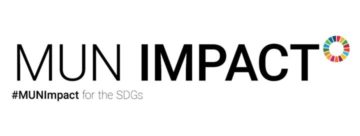
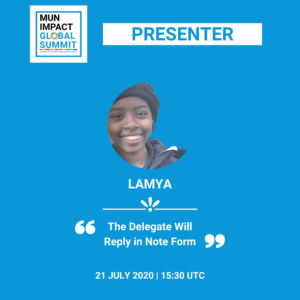 Lamya Adam, a student in year 11 at Doha College, Qatar presented to a group of over 50 students today at 15:30 UTC during the first day of the inaugural Global Summit. She addressed everyone on the topic of “the delegate will reply in note form.” Her presentation addressed a wide array of topics centered around resolution writing, presenting, and conference attending.
Lamya Adam, a student in year 11 at Doha College, Qatar presented to a group of over 50 students today at 15:30 UTC during the first day of the inaugural Global Summit. She addressed everyone on the topic of “the delegate will reply in note form.” Her presentation addressed a wide array of topics centered around resolution writing, presenting, and conference attending. 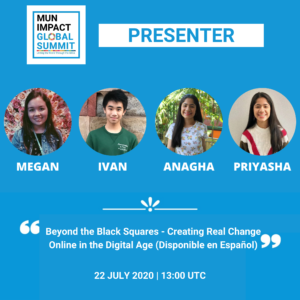 During the event, hundreds of people interested in humanitarian, climate, economic collaboration, and more, will be connected online, allowing a democratic learning never seen before, fruit of the emergence of the Digital Age. Global Connectivity through digital media has increasingly enabled effective action to support Sustainable Development Goals. It may be difficult to imagine such actions, but the activities may be easier than we imagined. So Megan Bickley, Ivan Wei, Anagha Chakravarti and Priyasha Chakravarti will present the workshop entitled “Beyond the Black Squares – Creating Real Change Online in the Digital Age” on July 22 at 13:00 UTC, in order to create an interactive environment where everyone can present their personal action plans.
During the event, hundreds of people interested in humanitarian, climate, economic collaboration, and more, will be connected online, allowing a democratic learning never seen before, fruit of the emergence of the Digital Age. Global Connectivity through digital media has increasingly enabled effective action to support Sustainable Development Goals. It may be difficult to imagine such actions, but the activities may be easier than we imagined. So Megan Bickley, Ivan Wei, Anagha Chakravarti and Priyasha Chakravarti will present the workshop entitled “Beyond the Black Squares – Creating Real Change Online in the Digital Age” on July 22 at 13:00 UTC, in order to create an interactive environment where everyone can present their personal action plans. 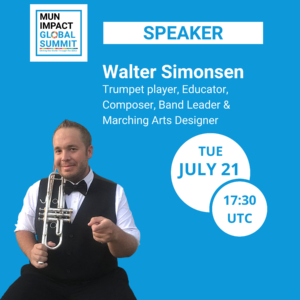 In addition to this workshop, on July 21 at 17:30 UTC, Walter Simonsen will present how MUN impacted his life as a Musician and Educator. Also, on July 22 at 16:00 UTC, Yara and Cynthia Changyit-Levin will present about Youth Advocacy on the National Stage. As such, the Global Summit will provide several spaces for mutual learning during the three days. You don’t want to miss this unique experience that will transform your way of thinking about the contemporary. Don’t forget to register!
In addition to this workshop, on July 21 at 17:30 UTC, Walter Simonsen will present how MUN impacted his life as a Musician and Educator. Also, on July 22 at 16:00 UTC, Yara and Cynthia Changyit-Levin will present about Youth Advocacy on the National Stage. As such, the Global Summit will provide several spaces for mutual learning during the three days. You don’t want to miss this unique experience that will transform your way of thinking about the contemporary. Don’t forget to register!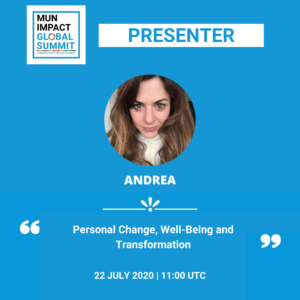 In her session, Andrea van Herk will share how you can fulfill your potential as a leader by making small daily changes and how you can have a healthier and balanced mindset to manifest a more balanced life.
In her session, Andrea van Herk will share how you can fulfill your potential as a leader by making small daily changes and how you can have a healthier and balanced mindset to manifest a more balanced life.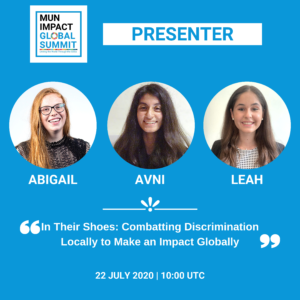 Between all the three presenters, they have participated in a total of 37 Model United Nations (MUN) conferences. Their international perspective ensures that you will learn a lot from their presentation.
Between all the three presenters, they have participated in a total of 37 Model United Nations (MUN) conferences. Their international perspective ensures that you will learn a lot from their presentation.